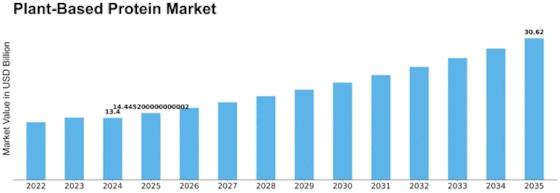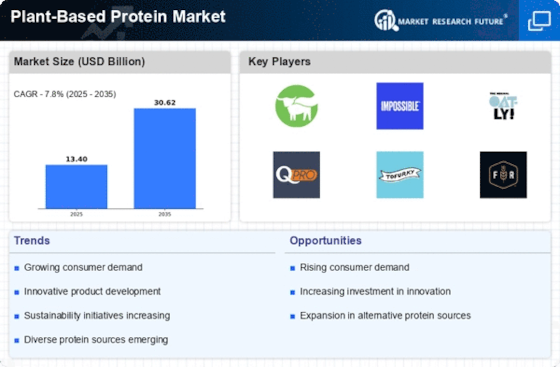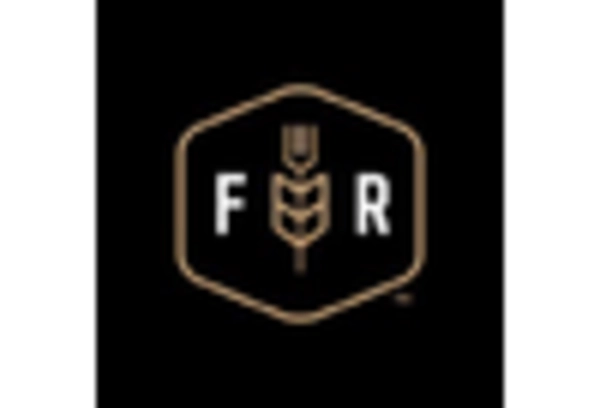-
FACTOR ANALYSIS
-
Value chain Analysis
-
Porter's
-
Five Forces Analysis
-
Bargaining Power of Suppliers
-
Bargaining
-
Power of Buyers
-
Threat of New Entrants
-
Threat
-
of Substitutes
-
Intensity of Rivalry
-
COVID-19
-
Impact Analysis
-
Market Impact Analysis
-
Regional
-
Impact
-
Opportunity and Threat Analysis
-
Plant-Based
-
Protein Market, BY Source (USD Billion)
-
Soy
-
Protein
-
Pea Protein
-
Rice Protein
-
Hemp
-
Protein
-
Wheat Protein
-
Plant-Based
-
Protein Market, BY Form (USD Billion)
-
Isolates
-
Concentrates
-
Textured
-
Protein
-
Hydrolysates
-
Plant-Based
-
Protein Market, BY Application (USD Billion)
-
Food
-
Beverages
-
Nutritional Supplements
-
Animal
-
Feed
-
Plant-Based Protein Market,
-
BY End Use (USD Billion)
-
Residential
-
Commercial
-
Institutional
-
Plant-Based
-
Protein Market, BY Regional (USD Billion)
-
North
-
America
-
US
-
Canada
-
Europe
-
Germany
-
UK
-
France
-
Russia
-
Italy
-
Spain
-
Rest
-
of Europe
-
APAC
-
China
-
India
-
Japan
-
South
-
Korea
-
Malaysia
-
Thailand
-
Indonesia
-
Rest
-
of APAC
-
South America
-
Brazil
-
Mexico
-
Argentina
-
Rest
-
of South America
-
MEA
-
GCC
-
Countries
-
South Africa
-
Rest
-
of MEA
-
Competitive
-
Landscape
-
Overview
-
Competitive
-
Analysis
-
Market share Analysis
-
Major
-
Growth Strategy in the Plant-Based Protein Market
-
Competitive
-
Benchmarking
-
Leading Players in Terms of Number of Developments
-
in the Plant-Based Protein Market
-
Key developments and
-
growth strategies
-
New Product Launch/Service Deployment
-
Merger
-
Acquisitions
-
Joint Ventures
-
Major
-
Players Financial Matrix
-
Sales and Operating Income
-
Major
-
Players RD Expenditure. 2023
-
Company
-
Profiles
-
DuPont
-
Financial
-
Overview
-
Products Offered
-
Key
-
Developments
-
SWOT Analysis
-
Key
-
Strategies
-
MorningStar Farms
-
Financial
-
Overview
-
Products Offered
-
Key
-
Developments
-
SWOT Analysis
-
Key
-
Strategies
-
Eat Just
-
Financial
-
Overview
-
Products Offered
-
Key
-
Developments
-
SWOT Analysis
-
Key
-
Strategies
-
Greenleaf Foods
-
Financial
-
Overview
-
Products Offered
-
Key
-
Developments
-
SWOT Analysis
-
Key
-
Strategies
-
Buffalo Wild Wings
-
Financial
-
Overview
-
Products Offered
-
Key
-
Developments
-
SWOT Analysis
-
Key
-
Strategies
-
Impossible Foods
-
Financial
-
Overview
-
Products Offered
-
Key
-
Developments
-
SWOT Analysis
-
Key
-
Strategies
-
Nestle
-
Financial
-
Overview
-
Products Offered
-
Key
-
Developments
-
SWOT Analysis
-
Key
-
Strategies
-
PepsiCo
-
Financial
-
Overview
-
Products Offered
-
Key
-
Developments
-
SWOT Analysis
-
Key
-
Strategies
-
Lightlife Foods
-
Financial
-
Overview
-
Products Offered
-
Key
-
Developments
-
SWOT Analysis
-
Key
-
Strategies
-
Quorn Foods
-
Financial
-
Overview
-
Products Offered
-
Key
-
Developments
-
SWOT Analysis
-
Key
-
Strategies
-
Field Roast
-
Financial
-
Overview
-
Products Offered
-
Key
-
Developments
-
SWOT Analysis
-
Key
-
Strategies
-
Oatly
-
Financial
-
Overview
-
Products Offered
-
Key
-
Developments
-
SWOT Analysis
-
Key
-
Strategies
-
protein2o
-
Financial
-
Overview
-
Products Offered
-
Key
-
Developments
-
SWOT Analysis
-
Key
-
Strategies
-
Beyond Meat
-
Financial
-
Overview
-
Products Offered
-
Key
-
Developments
-
SWOT Analysis
-
Key
-
Strategies
-
Tofurky
-
Financial
-
Overview
-
Products Offered
-
Key
-
Developments
-
SWOT Analysis
-
Key
-
Strategies
-
Appendix
-
References
-
Related
-
Reports
-
LIST Of tables
-
LIST
-
OF ASSUMPTIONS
-
North America Plant-Based Protein Market
-
SIZE ESTIMATES & FORECAST, BY SOURCE, 2019-2035 (USD Billions)
-
North
-
America Plant-Based Protein Market SIZE ESTIMATES & FORECAST, BY FORM, 2019-2035
-
(USD Billions)
-
North America Plant-Based Protein Market
-
SIZE ESTIMATES & FORECAST, BY APPLICATION, 2019-2035 (USD Billions)
-
North
-
America Plant-Based Protein Market SIZE ESTIMATES & FORECAST, BY END USE, 2019-2035
-
(USD Billions)
-
North America Plant-Based Protein Market
-
SIZE ESTIMATES & FORECAST, BY REGIONAL, 2019-2035 (USD Billions)
-
US
-
Plant-Based Protein Market SIZE ESTIMATES & FORECAST, BY SOURCE, 2019-2035 (USD
-
Billions)
-
US Plant-Based Protein Market SIZE ESTIMATES
-
& FORECAST, BY FORM, 2019-2035 (USD Billions)
-
US
-
Plant-Based Protein Market SIZE ESTIMATES & FORECAST, BY APPLICATION, 2019-2035
-
(USD Billions)
-
US Plant-Based Protein Market SIZE ESTIMATES
-
& FORECAST, BY END USE, 2019-2035 (USD Billions)
-
US
-
Plant-Based Protein Market SIZE ESTIMATES & FORECAST, BY REGIONAL, 2019-2035
-
(USD Billions)
-
Canada Plant-Based Protein Market SIZE
-
ESTIMATES & FORECAST, BY SOURCE, 2019-2035 (USD Billions)
-
Canada
-
Plant-Based Protein Market SIZE ESTIMATES & FORECAST, BY FORM, 2019-2035 (USD
-
Billions)
-
Canada Plant-Based Protein Market SIZE ESTIMATES
-
& FORECAST, BY APPLICATION, 2019-2035 (USD Billions)
-
Canada
-
Plant-Based Protein Market SIZE ESTIMATES & FORECAST, BY END USE, 2019-2035
-
(USD Billions)
-
Canada Plant-Based Protein Market SIZE
-
ESTIMATES & FORECAST, BY REGIONAL, 2019-2035 (USD Billions)
-
Europe
-
Plant-Based Protein Market SIZE ESTIMATES & FORECAST, BY SOURCE, 2019-2035 (USD
-
Billions)
-
Europe Plant-Based Protein Market SIZE ESTIMATES
-
& FORECAST, BY FORM, 2019-2035 (USD Billions)
-
Europe
-
Plant-Based Protein Market SIZE ESTIMATES & FORECAST, BY APPLICATION, 2019-2035
-
(USD Billions)
-
Europe Plant-Based Protein Market SIZE
-
ESTIMATES & FORECAST, BY END USE, 2019-2035 (USD Billions)
-
Europe
-
Plant-Based Protein Market SIZE ESTIMATES & FORECAST, BY REGIONAL, 2019-2035
-
(USD Billions)
-
Germany Plant-Based Protein Market SIZE
-
ESTIMATES & FORECAST, BY SOURCE, 2019-2035 (USD Billions)
-
Germany
-
Plant-Based Protein Market SIZE ESTIMATES & FORECAST, BY FORM, 2019-2035 (USD
-
Billions)
-
Germany Plant-Based Protein Market SIZE ESTIMATES
-
& FORECAST, BY APPLICATION, 2019-2035 (USD Billions)
-
Germany
-
Plant-Based Protein Market SIZE ESTIMATES & FORECAST, BY END USE, 2019-2035
-
(USD Billions)
-
Germany Plant-Based Protein Market SIZE
-
ESTIMATES & FORECAST, BY REGIONAL, 2019-2035 (USD Billions)
-
UK
-
Plant-Based Protein Market SIZE ESTIMATES & FORECAST, BY SOURCE, 2019-2035 (USD
-
Billions)
-
UK Plant-Based Protein Market SIZE ESTIMATES
-
& FORECAST, BY FORM, 2019-2035 (USD Billions)
-
UK
-
Plant-Based Protein Market SIZE ESTIMATES & FORECAST, BY APPLICATION, 2019-2035
-
(USD Billions)
-
UK Plant-Based Protein Market SIZE ESTIMATES
-
& FORECAST, BY END USE, 2019-2035 (USD Billions)
-
UK
-
Plant-Based Protein Market SIZE ESTIMATES & FORECAST, BY REGIONAL, 2019-2035
-
(USD Billions)
-
France Plant-Based Protein Market SIZE
-
ESTIMATES & FORECAST, BY SOURCE, 2019-2035 (USD Billions)
-
France
-
Plant-Based Protein Market SIZE ESTIMATES & FORECAST, BY FORM, 2019-2035 (USD
-
Billions)
-
France Plant-Based Protein Market SIZE ESTIMATES
-
& FORECAST, BY APPLICATION, 2019-2035 (USD Billions)
-
France
-
Plant-Based Protein Market SIZE ESTIMATES & FORECAST, BY END USE, 2019-2035
-
(USD Billions)
-
France Plant-Based Protein Market SIZE
-
ESTIMATES & FORECAST, BY REGIONAL, 2019-2035 (USD Billions)
-
Russia
-
Plant-Based Protein Market SIZE ESTIMATES & FORECAST, BY SOURCE, 2019-2035 (USD
-
Billions)
-
Russia Plant-Based Protein Market SIZE ESTIMATES
-
& FORECAST, BY FORM, 2019-2035 (USD Billions)
-
Russia
-
Plant-Based Protein Market SIZE ESTIMATES & FORECAST, BY APPLICATION, 2019-2035
-
(USD Billions)
-
Russia Plant-Based Protein Market SIZE
-
ESTIMATES & FORECAST, BY END USE, 2019-2035 (USD Billions)
-
Russia
-
Plant-Based Protein Market SIZE ESTIMATES & FORECAST, BY REGIONAL, 2019-2035
-
(USD Billions)
-
Italy Plant-Based Protein Market SIZE
-
ESTIMATES & FORECAST, BY SOURCE, 2019-2035 (USD Billions)
-
Italy
-
Plant-Based Protein Market SIZE ESTIMATES & FORECAST, BY FORM, 2019-2035 (USD
-
Billions)
-
Italy Plant-Based Protein Market SIZE ESTIMATES
-
& FORECAST, BY APPLICATION, 2019-2035 (USD Billions)
-
Italy
-
Plant-Based Protein Market SIZE ESTIMATES & FORECAST, BY END USE, 2019-2035
-
(USD Billions)
-
Italy Plant-Based Protein Market SIZE
-
ESTIMATES & FORECAST, BY REGIONAL, 2019-2035 (USD Billions)
-
Spain
-
Plant-Based Protein Market SIZE ESTIMATES & FORECAST, BY SOURCE, 2019-2035 (USD
-
Billions)
-
Spain Plant-Based Protein Market SIZE ESTIMATES
-
& FORECAST, BY FORM, 2019-2035 (USD Billions)
-
Spain
-
Plant-Based Protein Market SIZE ESTIMATES & FORECAST, BY APPLICATION, 2019-2035
-
(USD Billions)
-
Spain Plant-Based Protein Market SIZE
-
ESTIMATES & FORECAST, BY END USE, 2019-2035 (USD Billions)
-
Spain
-
Plant-Based Protein Market SIZE ESTIMATES & FORECAST, BY REGIONAL, 2019-2035
-
(USD Billions)
-
Rest of Europe Plant-Based Protein Market
-
SIZE ESTIMATES & FORECAST, BY SOURCE, 2019-2035 (USD Billions)
-
Rest
-
of Europe Plant-Based Protein Market SIZE ESTIMATES & FORECAST, BY FORM, 2019-2035
-
(USD Billions)
-
Rest of Europe Plant-Based Protein Market
-
SIZE ESTIMATES & FORECAST, BY APPLICATION, 2019-2035 (USD Billions)
-
Rest
-
of Europe Plant-Based Protein Market SIZE ESTIMATES & FORECAST, BY END USE,
-
Rest of Europe Plant-Based Protein
-
Market SIZE ESTIMATES & FORECAST, BY REGIONAL, 2019-2035 (USD Billions)
-
APAC
-
Plant-Based Protein Market SIZE ESTIMATES & FORECAST, BY SOURCE, 2019-2035 (USD
-
Billions)
-
APAC Plant-Based Protein Market SIZE ESTIMATES
-
& FORECAST, BY FORM, 2019-2035 (USD Billions)
-
APAC
-
Plant-Based Protein Market SIZE ESTIMATES & FORECAST, BY APPLICATION, 2019-2035
-
(USD Billions)
-
APAC Plant-Based Protein Market SIZE ESTIMATES
-
& FORECAST, BY END USE, 2019-2035 (USD Billions)
-
APAC
-
Plant-Based Protein Market SIZE ESTIMATES & FORECAST, BY REGIONAL, 2019-2035
-
(USD Billions)
-
China Plant-Based Protein Market SIZE
-
ESTIMATES & FORECAST, BY SOURCE, 2019-2035 (USD Billions)
-
China
-
Plant-Based Protein Market SIZE ESTIMATES & FORECAST, BY FORM, 2019-2035 (USD
-
Billions)
-
China Plant-Based Protein Market SIZE ESTIMATES
-
& FORECAST, BY APPLICATION, 2019-2035 (USD Billions)
-
China
-
Plant-Based Protein Market SIZE ESTIMATES & FORECAST, BY END USE, 2019-2035
-
(USD Billions)
-
China Plant-Based Protein Market SIZE
-
ESTIMATES & FORECAST, BY REGIONAL, 2019-2035 (USD Billions)
-
India
-
Plant-Based Protein Market SIZE ESTIMATES & FORECAST, BY SOURCE, 2019-2035 (USD
-
Billions)
-
India Plant-Based Protein Market SIZE ESTIMATES
-
& FORECAST, BY FORM, 2019-2035 (USD Billions)
-
India
-
Plant-Based Protein Market SIZE ESTIMATES & FORECAST, BY APPLICATION, 2019-2035
-
(USD Billions)
-
India Plant-Based Protein Market SIZE
-
ESTIMATES & FORECAST, BY END USE, 2019-2035 (USD Billions)
-
India
-
Plant-Based Protein Market SIZE ESTIMATES & FORECAST, BY REGIONAL, 2019-2035
-
(USD Billions)
-
Japan Plant-Based Protein Market SIZE
-
ESTIMATES & FORECAST, BY SOURCE, 2019-2035 (USD Billions)
-
Japan
-
Plant-Based Protein Market SIZE ESTIMATES & FORECAST, BY FORM, 2019-2035 (USD
-
Billions)
-
Japan Plant-Based Protein Market SIZE ESTIMATES
-
& FORECAST, BY APPLICATION, 2019-2035 (USD Billions)
-
Japan
-
Plant-Based Protein Market SIZE ESTIMATES & FORECAST, BY END USE, 2019-2035
-
(USD Billions)
-
Japan Plant-Based Protein Market SIZE
-
ESTIMATES & FORECAST, BY REGIONAL, 2019-2035 (USD Billions)
-
South
-
Korea Plant-Based Protein Market SIZE ESTIMATES & FORECAST, BY SOURCE, 2019-2035
-
(USD Billions)
-
South Korea Plant-Based Protein Market
-
SIZE ESTIMATES & FORECAST, BY FORM, 2019-2035 (USD Billions)
-
South
-
Korea Plant-Based Protein Market SIZE ESTIMATES & FORECAST, BY APPLICATION,
-
South Korea Plant-Based Protein
-
Market SIZE ESTIMATES & FORECAST, BY END USE, 2019-2035 (USD Billions)
-
South
-
Korea Plant-Based Protein Market SIZE ESTIMATES & FORECAST, BY REGIONAL, 2019-2035
-
(USD Billions)
-
Malaysia Plant-Based Protein Market SIZE
-
ESTIMATES & FORECAST, BY SOURCE, 2019-2035 (USD Billions)
-
Malaysia
-
Plant-Based Protein Market SIZE ESTIMATES & FORECAST, BY FORM, 2019-2035 (USD
-
Billions)
-
Malaysia Plant-Based Protein Market SIZE ESTIMATES
-
& FORECAST, BY APPLICATION, 2019-2035 (USD Billions)
-
Malaysia
-
Plant-Based Protein Market SIZE ESTIMATES & FORECAST, BY END USE, 2019-2035
-
(USD Billions)
-
Malaysia Plant-Based Protein Market SIZE
-
ESTIMATES & FORECAST, BY REGIONAL, 2019-2035 (USD Billions)
-
Thailand
-
Plant-Based Protein Market SIZE ESTIMATES & FORECAST, BY SOURCE, 2019-2035 (USD
-
Billions)
-
Thailand Plant-Based Protein Market SIZE ESTIMATES
-
& FORECAST, BY FORM, 2019-2035 (USD Billions)
-
Thailand
-
Plant-Based Protein Market SIZE ESTIMATES & FORECAST, BY APPLICATION, 2019-2035
-
(USD Billions)
-
Thailand Plant-Based Protein Market SIZE
-
ESTIMATES & FORECAST, BY END USE, 2019-2035 (USD Billions)
-
Thailand
-
Plant-Based Protein Market SIZE ESTIMATES & FORECAST, BY REGIONAL, 2019-2035
-
(USD Billions)
-
Indonesia Plant-Based Protein Market SIZE
-
ESTIMATES & FORECAST, BY SOURCE, 2019-2035 (USD Billions)
-
Indonesia
-
Plant-Based Protein Market SIZE ESTIMATES & FORECAST, BY FORM, 2019-2035 (USD
-
Billions)
-
Indonesia Plant-Based Protein Market SIZE ESTIMATES
-
& FORECAST, BY APPLICATION, 2019-2035 (USD Billions)
-
Indonesia
-
Plant-Based Protein Market SIZE ESTIMATES & FORECAST, BY END USE, 2019-2035
-
(USD Billions)
-
Indonesia Plant-Based Protein Market SIZE
-
ESTIMATES & FORECAST, BY REGIONAL, 2019-2035 (USD Billions)
-
Rest
-
of APAC Plant-Based Protein Market SIZE ESTIMATES & FORECAST, BY SOURCE, 2019-2035
-
(USD Billions)
-
Rest of APAC Plant-Based Protein Market
-
SIZE ESTIMATES & FORECAST, BY FORM, 2019-2035 (USD Billions)
-
Rest
-
of APAC Plant-Based Protein Market SIZE ESTIMATES & FORECAST, BY APPLICATION,
-
Rest of APAC Plant-Based Protein
-
Market SIZE ESTIMATES & FORECAST, BY END USE, 2019-2035 (USD Billions)
-
Rest
-
of APAC Plant-Based Protein Market SIZE ESTIMATES & FORECAST, BY REGIONAL, 2019-2035
-
(USD Billions)
-
South America Plant-Based Protein Market
-
SIZE ESTIMATES & FORECAST, BY SOURCE, 2019-2035 (USD Billions)
-
South
-
America Plant-Based Protein Market SIZE ESTIMATES & FORECAST, BY FORM, 2019-2035
-
(USD Billions)
-
South America Plant-Based Protein Market
-
SIZE ESTIMATES & FORECAST, BY APPLICATION, 2019-2035 (USD Billions)
-
South
-
America Plant-Based Protein Market SIZE ESTIMATES & FORECAST, BY END USE, 2019-2035
-
(USD Billions)
-
South America Plant-Based Protein Market
-
SIZE ESTIMATES & FORECAST, BY REGIONAL, 2019-2035 (USD Billions)
-
Brazil
-
Plant-Based Protein Market SIZE ESTIMATES & FORECAST, BY SOURCE, 2019-2035 (USD
-
Billions)
-
Brazil Plant-Based Protein Market SIZE ESTIMATES
-
& FORECAST, BY FORM, 2019-2035 (USD Billions)
-
Brazil
-
Plant-Based Protein Market SIZE ESTIMATES & FORECAST, BY APPLICATION, 2019-2035
-
(USD Billions)
-
Brazil Plant-Based Protein Market SIZE
-
ESTIMATES & FORECAST, BY END USE, 2019-2035 (USD Billions)
-
Brazil
-
Plant-Based Protein Market SIZE ESTIMATES & FORECAST, BY REGIONAL, 2019-2035
-
(USD Billions)
-
Mexico Plant-Based Protein Market SIZE
-
ESTIMATES & FORECAST, BY SOURCE, 2019-2035 (USD Billions)
-
Mexico
-
Plant-Based Protein Market SIZE ESTIMATES & FORECAST, BY FORM, 2019-2035 (USD
-
Billions)
-
Mexico Plant-Based Protein Market SIZE ESTIMATES
-
& FORECAST, BY APPLICATION, 2019-2035 (USD Billions)
-
Mexico
-
Plant-Based Protein Market SIZE ESTIMATES & FORECAST, BY END USE, 2019-2035
-
(USD Billions)
-
Mexico Plant-Based Protein Market SIZE
-
ESTIMATES & FORECAST, BY REGIONAL, 2019-2035 (USD Billions)
-
Argentina
-
Plant-Based Protein Market SIZE ESTIMATES & FORECAST, BY SOURCE, 2019-2035 (USD
-
Billions)
-
Argentina Plant-Based Protein Market SIZE ESTIMATES
-
& FORECAST, BY FORM, 2019-2035 (USD Billions)
-
Argentina
-
Plant-Based Protein Market SIZE ESTIMATES & FORECAST, BY APPLICATION, 2019-2035
-
(USD Billions)
-
Argentina Plant-Based Protein Market SIZE
-
ESTIMATES & FORECAST, BY END USE, 2019-2035 (USD Billions)
-
Argentina
-
Plant-Based Protein Market SIZE ESTIMATES & FORECAST, BY REGIONAL, 2019-2035
-
(USD Billions)
-
Rest of South America Plant-Based Protein
-
Market SIZE ESTIMATES & FORECAST, BY SOURCE, 2019-2035 (USD Billions)
-
Rest
-
of South America Plant-Based Protein Market SIZE ESTIMATES & FORECAST, BY FORM,
-
Rest of South America Plant-Based
-
Protein Market SIZE ESTIMATES & FORECAST, BY APPLICATION, 2019-2035 (USD Billions)
-
Rest
-
of South America Plant-Based Protein Market SIZE ESTIMATES & FORECAST, BY END
-
USE, 2019-2035 (USD Billions)
-
Rest of South America Plant-Based
-
Protein Market SIZE ESTIMATES & FORECAST, BY REGIONAL, 2019-2035 (USD Billions)
-
MEA
-
Plant-Based Protein Market SIZE ESTIMATES & FORECAST, BY SOURCE, 2019-2035 (USD
-
Billions)
-
MEA Plant-Based Protein Market SIZE ESTIMATES
-
& FORECAST, BY FORM, 2019-2035 (USD Billions)
-
MEA
-
Plant-Based Protein Market SIZE ESTIMATES & FORECAST, BY APPLICATION, 2019-2035
-
(USD Billions)
-
MEA Plant-Based Protein Market SIZE ESTIMATES
-
& FORECAST, BY END USE, 2019-2035 (USD Billions)
-
MEA
-
Plant-Based Protein Market SIZE ESTIMATES & FORECAST, BY REGIONAL, 2019-2035
-
(USD Billions)
-
GCC Countries Plant-Based Protein Market
-
SIZE ESTIMATES & FORECAST, BY SOURCE, 2019-2035 (USD Billions)
-
GCC
-
Countries Plant-Based Protein Market SIZE ESTIMATES & FORECAST, BY FORM, 2019-2035
-
(USD Billions)
-
GCC Countries Plant-Based Protein Market
-
SIZE ESTIMATES & FORECAST, BY APPLICATION, 2019-2035 (USD Billions)
-
GCC
-
Countries Plant-Based Protein Market SIZE ESTIMATES & FORECAST, BY END USE,
-
GCC Countries Plant-Based Protein
-
Market SIZE ESTIMATES & FORECAST, BY REGIONAL, 2019-2035 (USD Billions)
-
South
-
Africa Plant-Based Protein Market SIZE ESTIMATES & FORECAST, BY SOURCE, 2019-2035
-
(USD Billions)
-
South Africa Plant-Based Protein Market
-
SIZE ESTIMATES & FORECAST, BY FORM, 2019-2035 (USD Billions)
-
South
-
Africa Plant-Based Protein Market SIZE ESTIMATES & FORECAST, BY APPLICATION,
-
South Africa Plant-Based Protein
-
Market SIZE ESTIMATES & FORECAST, BY END USE, 2019-2035 (USD Billions)
-
South
-
Africa Plant-Based Protein Market SIZE ESTIMATES & FORECAST, BY REGIONAL, 2019-2035
-
(USD Billions)
-
Rest of MEA Plant-Based Protein Market
-
SIZE ESTIMATES & FORECAST, BY SOURCE, 2019-2035 (USD Billions)
-
Rest
-
of MEA Plant-Based Protein Market SIZE ESTIMATES & FORECAST, BY FORM, 2019-2035
-
(USD Billions)
-
Rest of MEA Plant-Based Protein Market
-
SIZE ESTIMATES & FORECAST, BY APPLICATION, 2019-2035 (USD Billions)
-
Rest
-
of MEA Plant-Based Protein Market SIZE ESTIMATES & FORECAST, BY END USE, 2019-2035
-
(USD Billions)
-
Rest of MEA Plant-Based Protein Market
-
SIZE ESTIMATES & FORECAST, BY REGIONAL, 2019-2035 (USD Billions)
-
PRODUCT
-
LAUNCH/PRODUCT DEVELOPMENT/APPROVAL
-
ACQUISITION/PARTNERSHIP
-
LIST
-
Of figures
-
MARKET SYNOPSIS
-
NORTH
-
AMERICA PLANT-BASED PROTEIN MARKET ANALYSIS
-
US PLANT-BASED
-
PROTEIN MARKET ANALYSIS BY SOURCE
-
US PLANT-BASED PROTEIN
-
MARKET ANALYSIS BY FORM
-
US PLANT-BASED PROTEIN MARKET
-
ANALYSIS BY APPLICATION
-
US PLANT-BASED PROTEIN MARKET
-
ANALYSIS BY END USE
-
US PLANT-BASED PROTEIN MARKET ANALYSIS
-
BY REGIONAL
-
CANADA PLANT-BASED PROTEIN MARKET ANALYSIS
-
BY SOURCE
-
CANADA PLANT-BASED PROTEIN MARKET ANALYSIS
-
BY FORM
-
CANADA PLANT-BASED PROTEIN MARKET ANALYSIS BY
-
APPLICATION
-
CANADA PLANT-BASED PROTEIN MARKET ANALYSIS
-
BY END USE
-
CANADA PLANT-BASED PROTEIN MARKET ANALYSIS
-
BY REGIONAL
-
EUROPE PLANT-BASED PROTEIN MARKET ANALYSIS
-
GERMANY
-
PLANT-BASED PROTEIN MARKET ANALYSIS BY SOURCE
-
GERMANY
-
PLANT-BASED PROTEIN MARKET ANALYSIS BY FORM
-
GERMANY PLANT-BASED
-
PROTEIN MARKET ANALYSIS BY APPLICATION
-
GERMANY PLANT-BASED
-
PROTEIN MARKET ANALYSIS BY END USE
-
GERMANY PLANT-BASED
-
PROTEIN MARKET ANALYSIS BY REGIONAL
-
UK PLANT-BASED PROTEIN
-
MARKET ANALYSIS BY SOURCE
-
UK PLANT-BASED PROTEIN MARKET
-
ANALYSIS BY FORM
-
UK PLANT-BASED PROTEIN MARKET ANALYSIS
-
BY APPLICATION
-
UK PLANT-BASED PROTEIN MARKET ANALYSIS
-
BY END USE
-
UK PLANT-BASED PROTEIN MARKET ANALYSIS BY
-
REGIONAL
-
FRANCE PLANT-BASED PROTEIN MARKET ANALYSIS BY
-
SOURCE
-
FRANCE PLANT-BASED PROTEIN MARKET ANALYSIS BY
-
FORM
-
FRANCE PLANT-BASED PROTEIN MARKET ANALYSIS BY APPLICATION
-
FRANCE
-
PLANT-BASED PROTEIN MARKET ANALYSIS BY END USE
-
FRANCE
-
PLANT-BASED PROTEIN MARKET ANALYSIS BY REGIONAL
-
RUSSIA
-
PLANT-BASED PROTEIN MARKET ANALYSIS BY SOURCE
-
RUSSIA
-
PLANT-BASED PROTEIN MARKET ANALYSIS BY FORM
-
RUSSIA PLANT-BASED
-
PROTEIN MARKET ANALYSIS BY APPLICATION
-
RUSSIA PLANT-BASED
-
PROTEIN MARKET ANALYSIS BY END USE
-
RUSSIA PLANT-BASED
-
PROTEIN MARKET ANALYSIS BY REGIONAL
-
ITALY PLANT-BASED
-
PROTEIN MARKET ANALYSIS BY SOURCE
-
ITALY PLANT-BASED PROTEIN
-
MARKET ANALYSIS BY FORM
-
ITALY PLANT-BASED PROTEIN MARKET
-
ANALYSIS BY APPLICATION
-
ITALY PLANT-BASED PROTEIN MARKET
-
ANALYSIS BY END USE
-
ITALY PLANT-BASED PROTEIN MARKET
-
ANALYSIS BY REGIONAL
-
SPAIN PLANT-BASED PROTEIN MARKET
-
ANALYSIS BY SOURCE
-
SPAIN PLANT-BASED PROTEIN MARKET ANALYSIS
-
BY FORM
-
SPAIN PLANT-BASED PROTEIN MARKET ANALYSIS BY
-
APPLICATION
-
SPAIN PLANT-BASED PROTEIN MARKET ANALYSIS
-
BY END USE
-
SPAIN PLANT-BASED PROTEIN MARKET ANALYSIS
-
BY REGIONAL
-
REST OF EUROPE PLANT-BASED PROTEIN MARKET
-
ANALYSIS BY SOURCE
-
REST OF EUROPE PLANT-BASED PROTEIN
-
MARKET ANALYSIS BY FORM
-
REST OF EUROPE PLANT-BASED PROTEIN
-
MARKET ANALYSIS BY APPLICATION
-
REST OF EUROPE PLANT-BASED
-
PROTEIN MARKET ANALYSIS BY END USE
-
REST OF EUROPE PLANT-BASED
-
PROTEIN MARKET ANALYSIS BY REGIONAL
-
APAC PLANT-BASED
-
PROTEIN MARKET ANALYSIS
-
CHINA PLANT-BASED PROTEIN MARKET
-
ANALYSIS BY SOURCE
-
CHINA PLANT-BASED PROTEIN MARKET ANALYSIS
-
BY FORM
-
CHINA PLANT-BASED PROTEIN MARKET ANALYSIS BY
-
APPLICATION
-
CHINA PLANT-BASED PROTEIN MARKET ANALYSIS
-
BY END USE
-
CHINA PLANT-BASED PROTEIN MARKET ANALYSIS
-
BY REGIONAL
-
INDIA PLANT-BASED PROTEIN MARKET ANALYSIS
-
BY SOURCE
-
INDIA PLANT-BASED PROTEIN MARKET ANALYSIS BY
-
FORM
-
INDIA PLANT-BASED PROTEIN MARKET ANALYSIS BY APPLICATION
-
INDIA
-
PLANT-BASED PROTEIN MARKET ANALYSIS BY END USE
-
INDIA
-
PLANT-BASED PROTEIN MARKET ANALYSIS BY REGIONAL
-
JAPAN
-
PLANT-BASED PROTEIN MARKET ANALYSIS BY SOURCE
-
JAPAN PLANT-BASED
-
PROTEIN MARKET ANALYSIS BY FORM
-
JAPAN PLANT-BASED PROTEIN
-
MARKET ANALYSIS BY APPLICATION
-
JAPAN PLANT-BASED PROTEIN
-
MARKET ANALYSIS BY END USE
-
JAPAN PLANT-BASED PROTEIN
-
MARKET ANALYSIS BY REGIONAL
-
SOUTH KOREA PLANT-BASED PROTEIN
-
MARKET ANALYSIS BY SOURCE
-
SOUTH KOREA PLANT-BASED PROTEIN
-
MARKET ANALYSIS BY FORM
-
SOUTH KOREA PLANT-BASED PROTEIN
-
MARKET ANALYSIS BY APPLICATION
-
SOUTH KOREA PLANT-BASED
-
PROTEIN MARKET ANALYSIS BY END USE
-
SOUTH KOREA PLANT-BASED
-
PROTEIN MARKET ANALYSIS BY REGIONAL
-
MALAYSIA PLANT-BASED
-
PROTEIN MARKET ANALYSIS BY SOURCE
-
MALAYSIA PLANT-BASED
-
PROTEIN MARKET ANALYSIS BY FORM
-
MALAYSIA PLANT-BASED
-
PROTEIN MARKET ANALYSIS BY APPLICATION
-
MALAYSIA PLANT-BASED
-
PROTEIN MARKET ANALYSIS BY END USE
-
MALAYSIA PLANT-BASED
-
PROTEIN MARKET ANALYSIS BY REGIONAL
-
THAILAND PLANT-BASED
-
PROTEIN MARKET ANALYSIS BY SOURCE
-
THAILAND PLANT-BASED
-
PROTEIN MARKET ANALYSIS BY FORM
-
THAILAND PLANT-BASED
-
PROTEIN MARKET ANALYSIS BY APPLICATION
-
THAILAND PLANT-BASED
-
PROTEIN MARKET ANALYSIS BY END USE
-
THAILAND PLANT-BASED
-
PROTEIN MARKET ANALYSIS BY REGIONAL
-
INDONESIA PLANT-BASED
-
PROTEIN MARKET ANALYSIS BY SOURCE
-
INDONESIA PLANT-BASED
-
PROTEIN MARKET ANALYSIS BY FORM
-
INDONESIA PLANT-BASED
-
PROTEIN MARKET ANALYSIS BY APPLICATION
-
INDONESIA PLANT-BASED
-
PROTEIN MARKET ANALYSIS BY END USE
-
INDONESIA PLANT-BASED
-
PROTEIN MARKET ANALYSIS BY REGIONAL
-
REST OF APAC PLANT-BASED
-
PROTEIN MARKET ANALYSIS BY SOURCE
-
REST OF APAC PLANT-BASED
-
PROTEIN MARKET ANALYSIS BY FORM
-
REST OF APAC PLANT-BASED
-
PROTEIN MARKET ANALYSIS BY APPLICATION
-
REST OF APAC PLANT-BASED
-
PROTEIN MARKET ANALYSIS BY END USE
-
REST OF APAC PLANT-BASED
-
PROTEIN MARKET ANALYSIS BY REGIONAL
-
SOUTH AMERICA PLANT-BASED
-
PROTEIN MARKET ANALYSIS
-
BRAZIL PLANT-BASED PROTEIN MARKET
-
ANALYSIS BY SOURCE
-
BRAZIL PLANT-BASED PROTEIN MARKET
-
ANALYSIS BY FORM
-
BRAZIL PLANT-BASED PROTEIN MARKET ANALYSIS
-
BY APPLICATION
-
BRAZIL PLANT-BASED PROTEIN MARKET ANALYSIS
-
BY END USE
-
BRAZIL PLANT-BASED PROTEIN MARKET ANALYSIS
-
BY REGIONAL
-
MEXICO PLANT-BASED PROTEIN MARKET ANALYSIS
-
BY SOURCE
-
MEXICO PLANT-BASED PROTEIN MARKET ANALYSIS
-
BY FORM
-
MEXICO PLANT-BASED PROTEIN MARKET ANALYSIS BY
-
APPLICATION
-
MEXICO PLANT-BASED PROTEIN MARKET ANALYSIS
-
BY END USE
-
MEXICO PLANT-BASED PROTEIN MARKET ANALYSIS
-
BY REGIONAL
-
ARGENTINA PLANT-BASED PROTEIN MARKET ANALYSIS
-
BY SOURCE
-
ARGENTINA PLANT-BASED PROTEIN MARKET ANALYSIS
-
BY FORM
-
ARGENTINA PLANT-BASED PROTEIN MARKET ANALYSIS
-
BY APPLICATION
-
ARGENTINA PLANT-BASED PROTEIN MARKET ANALYSIS
-
BY END USE
-
ARGENTINA PLANT-BASED PROTEIN MARKET ANALYSIS
-
BY REGIONAL
-
REST OF SOUTH AMERICA PLANT-BASED PROTEIN
-
MARKET ANALYSIS BY SOURCE
-
REST OF SOUTH AMERICA PLANT-BASED
-
PROTEIN MARKET ANALYSIS BY FORM
-
REST OF SOUTH AMERICA
-
PLANT-BASED PROTEIN MARKET ANALYSIS BY APPLICATION
-
REST
-
OF SOUTH AMERICA PLANT-BASED PROTEIN MARKET ANALYSIS BY END USE
-
REST
-
OF SOUTH AMERICA PLANT-BASED PROTEIN MARKET ANALYSIS BY REGIONAL
-
MEA
-
PLANT-BASED PROTEIN MARKET ANALYSIS
-
GCC COUNTRIES PLANT-BASED
-
PROTEIN MARKET ANALYSIS BY SOURCE
-
GCC COUNTRIES PLANT-BASED
-
PROTEIN MARKET ANALYSIS BY FORM
-
GCC COUNTRIES PLANT-BASED
-
PROTEIN MARKET ANALYSIS BY APPLICATION
-
GCC COUNTRIES
-
PLANT-BASED PROTEIN MARKET ANALYSIS BY END USE
-
GCC COUNTRIES
-
PLANT-BASED PROTEIN MARKET ANALYSIS BY REGIONAL
-
SOUTH
-
AFRICA PLANT-BASED PROTEIN MARKET ANALYSIS BY SOURCE
-
SOUTH
-
AFRICA PLANT-BASED PROTEIN MARKET ANALYSIS BY FORM
-
SOUTH
-
AFRICA PLANT-BASED PROTEIN MARKET ANALYSIS BY APPLICATION
-
SOUTH
-
AFRICA PLANT-BASED PROTEIN MARKET ANALYSIS BY END USE
-
SOUTH
-
AFRICA PLANT-BASED PROTEIN MARKET ANALYSIS BY REGIONAL
-
REST
-
OF MEA PLANT-BASED PROTEIN MARKET ANALYSIS BY SOURCE
-
REST
-
OF MEA PLANT-BASED PROTEIN MARKET ANALYSIS BY FORM
-
REST
-
OF MEA PLANT-BASED PROTEIN MARKET ANALYSIS BY APPLICATION
-
REST
-
OF MEA PLANT-BASED PROTEIN MARKET ANALYSIS BY END USE
-
REST
-
OF MEA PLANT-BASED PROTEIN MARKET ANALYSIS BY REGIONAL
-
KEY
-
BUYING CRITERIA OF PLANT-BASED PROTEIN MARKET
-
RESEARCH
-
PROCESS OF MRFR
-
DRO ANALYSIS OF PLANT-BASED PROTEIN MARKET
-
DRIVERS
-
IMPACT ANALYSIS: PLANT-BASED PROTEIN MARKET
-
RESTRAINTS
-
IMPACT ANALYSIS: PLANT-BASED PROTEIN MARKET
-
SUPPLY /
-
VALUE CHAIN: PLANT-BASED PROTEIN MARKET
-
PLANT-BASED PROTEIN
-
MARKET, BY SOURCE, 2025 (% SHARE)
-
PLANT-BASED PROTEIN
-
MARKET, BY SOURCE, 2019 TO 2035 (USD Billions)
-
PLANT-BASED
-
PROTEIN MARKET, BY FORM, 2025 (% SHARE)
-
PLANT-BASED PROTEIN
-
MARKET, BY FORM, 2019 TO 2035 (USD Billions)
-
PLANT-BASED
-
PROTEIN MARKET, BY APPLICATION, 2025 (% SHARE)
-
PLANT-BASED
-
PROTEIN MARKET, BY APPLICATION, 2019 TO 2035 (USD Billions)
-
PLANT-BASED
-
PROTEIN MARKET, BY END USE, 2025 (% SHARE)
-
PLANT-BASED
-
PROTEIN MARKET, BY END USE, 2019 TO 2035 (USD Billions)
-
PLANT-BASED
-
PROTEIN MARKET, BY REGIONAL, 2025 (% SHARE)
-
PLANT-BASED
-
PROTEIN MARKET, BY REGIONAL, 2019 TO 2035 (USD Billions)
-
BENCHMARKING
-
OF MAJOR COMPETITORS



















Leave a Comment